-
 Bitcoin
Bitcoin $84,113.0667
-0.50% -
 Ethereum
Ethereum $1,603.3872
-0.80% -
 Tether USDt
Tether USDt $1.0000
0.02% -
 XRP
XRP $2.1214
-0.30% -
 BNB
BNB $583.1191
-0.38% -
 Solana
Solana $128.3486
-0.41% -
 USDC
USDC $0.9999
0.01% -
 TRON
TRON $0.2507
-0.43% -
 Dogecoin
Dogecoin $0.1560
-1.08% -
 Cardano
Cardano $0.6175
-2.34% -
 UNUS SED LEO
UNUS SED LEO $9.3641
-0.39% -
 Chainlink
Chainlink $12.4044
-1.53% -
 Avalanche
Avalanche $19.4189
-3.30% -
 Stellar
Stellar $0.2411
1.31% -
 Toncoin
Toncoin $2.9373
2.66% -
 Shiba Inu
Shiba Inu $0.0...01179
-1.31% -
 Sui
Sui $2.1242
-2.42% -
 Hedera
Hedera $0.1580
-4.01% -
 Bitcoin Cash
Bitcoin Cash $323.7953
-0.16% -
 Litecoin
Litecoin $76.0133
-0.95% -
 Polkadot
Polkadot $3.5856
-2.67% -
 Dai
Dai $1.0000
0.01% -
 Bitget Token
Bitget Token $4.2780
0.01% -
 Hyperliquid
Hyperliquid $15.3739
-1.78% -
 Ethena USDe
Ethena USDe $0.9992
0.02% -
 Pi
Pi $0.6465
-11.86% -
 Monero
Monero $214.5536
0.11% -
 Uniswap
Uniswap $5.2468
-1.95% -
 OKB
OKB $51.0834
-3.34% -
 Pepe
Pepe $0.0...07010
-3.44%
Why does the NFT secondary market trading platform need smart contracts?
Smart contracts are essential in NFT secondary markets for ensuring secure transactions, automating royalties, and maintaining ownership records on the blockchain.
Apr 14, 2025 at 05:07 pm
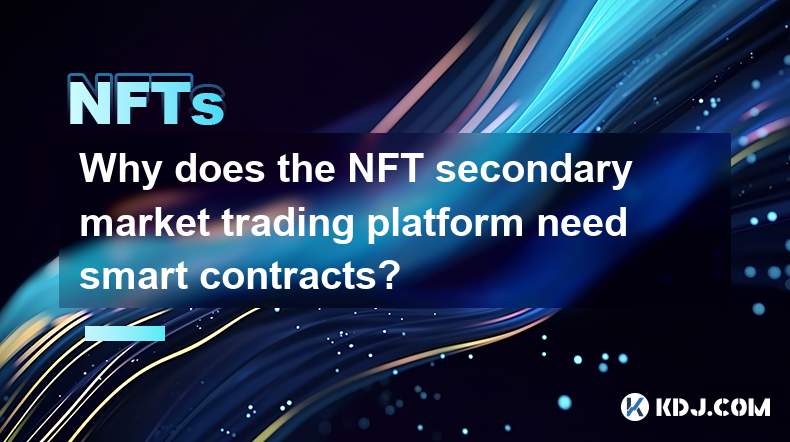
Why does the NFT secondary market trading platform need smart contracts?
Non-Fungible Tokens (NFTs) have revolutionized the way digital assets are created, owned, and traded. At the heart of NFT trading platforms, especially in the secondary market, lies the crucial technology of smart contracts. This article explores the necessity and functionality of smart contracts within NFT secondary market trading platforms, detailing their role in ensuring secure, transparent, and efficient transactions.
What are Smart Contracts and How Do They Work in NFTs?
Smart contracts are self-executing contracts with the terms of the agreement directly written into code. They run on blockchain technology, which means they are decentralized and operate autonomously. In the context of NFTs, smart contracts are essential for defining the ownership and transfer rules of the tokens. They automate the process of buying, selling, and transferring NFTs, ensuring that transactions occur only when predefined conditions are met.
For instance, when a user decides to purchase an NFT on a secondary market, the smart contract verifies the buyer's payment, transfers the NFT from the seller to the buyer, and releases the funds to the seller. This entire process is executed without the need for intermediaries, reducing the risk of fraud and increasing efficiency.
Ensuring Ownership and Provenance
One of the primary reasons smart contracts are indispensable in NFT secondary market trading platforms is their ability to ensure ownership and provenance. Each NFT is unique and represents ownership of a specific digital asset. Smart contracts record this ownership on the blockchain, providing an immutable ledger of who owns what.
When an NFT changes hands on the secondary market, the smart contract updates the ownership details automatically. This ensures that the provenance of the NFT—the history of its ownership—is transparent and verifiable. Buyers can trace the NFT back to its origin, ensuring they are purchasing a legitimate asset.
Automating Royalties for Creators
Another significant benefit of using smart contracts in NFT secondary market trading platforms is the ability to automate royalties for creators. Many NFTs come with a royalty clause, where the original creator receives a percentage of the sale price every time the NFT is resold. Smart contracts can encode this royalty mechanism directly into the NFT, ensuring that creators are compensated automatically with each subsequent sale.
For example, if an NFT is sold with a 10% royalty, the smart contract will automatically calculate and transfer 10% of the sale price to the original creator's wallet. This not only incentivizes creators to produce high-quality NFTs but also ensures they continue to benefit from the popularity of their work in the secondary market.
Facilitating Trustless Transactions
The concept of trustless transactions is central to blockchain technology and is particularly relevant in the NFT secondary market. Smart contracts enable trustless transactions by ensuring that both parties adhere to the agreed-upon terms without needing to trust each other or a third party. The code of the smart contract acts as the arbiter, enforcing the rules and executing the transaction automatically.
This is particularly important in the secondary market, where buyers and sellers may not know each other. The smart contract ensures that the buyer receives the NFT only after payment is confirmed, and the seller receives payment only after the NFT is transferred. This reduces the risk of fraud and increases confidence in the platform.
Enforcing Compliance and Reducing Disputes
Smart contracts also play a crucial role in enforcing compliance and reducing disputes on NFT secondary market trading platforms. By encoding the rules of the platform directly into the smart contract, it becomes easier to ensure that all transactions comply with the platform's policies. For example, the smart contract can enforce rules such as minimum sale prices, maximum transaction fees, or restrictions on certain types of NFTs.
In the event of a dispute, the smart contract provides a clear record of the transaction, which can be used to resolve conflicts. Since the terms of the transaction are transparent and immutable, it becomes easier to determine the rightful course of action, reducing the need for costly and time-consuming legal battles.
Enhancing Platform Efficiency and Scalability
Finally, smart contracts contribute to the efficiency and scalability of NFT secondary market trading platforms. By automating the transaction process, smart contracts reduce the need for manual intervention, speeding up the buying and selling process. This is particularly important in a market that can see high volumes of transactions.
Moreover, smart contracts can be designed to handle a large number of transactions simultaneously, enhancing the scalability of the platform. As the NFT market grows, platforms that leverage smart contracts can more easily accommodate increased demand without compromising on performance.
Frequently Asked Questions
Q1: Can smart contracts be modified after an NFT is minted?
A1: Once an NFT is minted and the smart contract is deployed on the blockchain, it is generally immutable. This means that the terms of the smart contract, including rules for ownership and royalties, cannot be changed. However, some platforms may offer the ability to upgrade or replace smart contracts through specific governance mechanisms, but this is less common and requires careful consideration of the implications.
Q2: How do smart contracts handle gas fees in NFT transactions?
A2: Gas fees are the costs associated with executing transactions on a blockchain. In NFT transactions, the smart contract can be programmed to handle gas fees in different ways. Typically, the buyer or seller is responsible for paying the gas fees, which are calculated based on the complexity of the transaction and the current demand on the network. Some platforms may also implement gas fee optimization techniques to reduce costs for users.
Q3: Are there any risks associated with smart contracts in NFT trading?
A3: While smart contracts offer many benefits, there are also risks involved. One major risk is the potential for bugs or vulnerabilities in the smart contract code, which could be exploited by malicious actors. Additionally, if the smart contract is not properly audited or tested, it may not function as intended, leading to issues with transactions or royalty payments. It's important for platforms to conduct thorough security audits and for users to understand the terms of the smart contracts they interact with.
Q4: Can smart contracts be used to create NFTs that cannot be resold?
A4: Yes, smart contracts can be designed to include restrictions on the resale of NFTs. For example, a smart contract can be programmed to prevent the transfer of an NFT to another wallet after the initial purchase, effectively making it non-transferable. This can be useful for certain use cases, such as limited edition digital collectibles that the creator wants to keep exclusive to the original buyers.
Disclaimer:info@kdj.com
The information provided is not trading advice. kdj.com does not assume any responsibility for any investments made based on the information provided in this article. Cryptocurrencies are highly volatile and it is highly recommended that you invest with caution after thorough research!
If you believe that the content used on this website infringes your copyright, please contact us immediately (info@kdj.com) and we will delete it promptly.
- Bitcoin (BTC) price reaches a daily high of $86429
- 2025-04-16 06:05:13
- Wall Street's Recession Sirens Are Blaring — and Bitcoin's BTC/USD Defiant Rally Has Investors Asking: Is This Digital Gold 2.0?
- 2025-04-16 06:05:13
- Coinbase (COIN) Drops 100+ Crypto Assets from Custody Service
- 2025-04-16 06:00:12
- Mantra (OM) Coin Price is Putting Hope in Investors' Eyes After Crashing 90% Few Days Ago
- 2025-04-16 06:00:12
- Bitcoin (BTC) Just Days Away From Confirming Major Bullish Breakout, Says Crypto Analyst
- 2025-04-16 05:55:12
- USDC (USDC), CCTP v2 and Circle Wallets Will Launch on Monad's Mainnet When It Goes Live
- 2025-04-16 05:55:12
Related knowledge
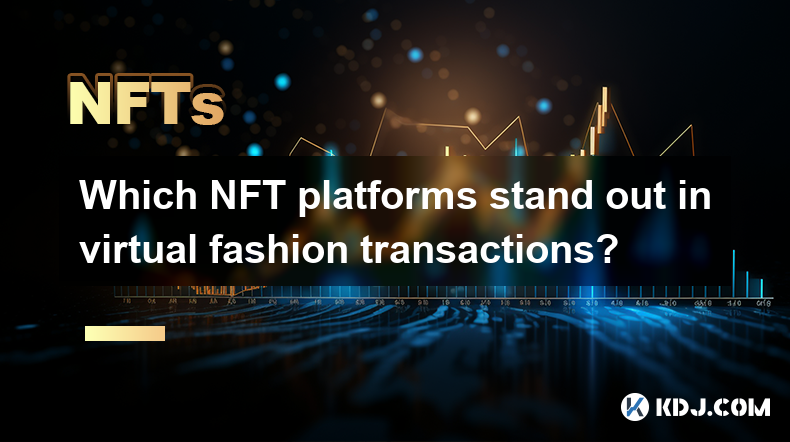
Which NFT platforms stand out in virtual fashion transactions?
Apr 15,2025 at 02:29am
In the dynamic world of cryptocurrency and digital assets, Non-Fungible Tokens (NFTs) have carved out a significant niche, particularly in the realm of virtual fashion. As the demand for unique digital wearables and accessories grows, several NFT platforms have emerged as leaders in facilitating these transactions. This article explores the standout NFT...
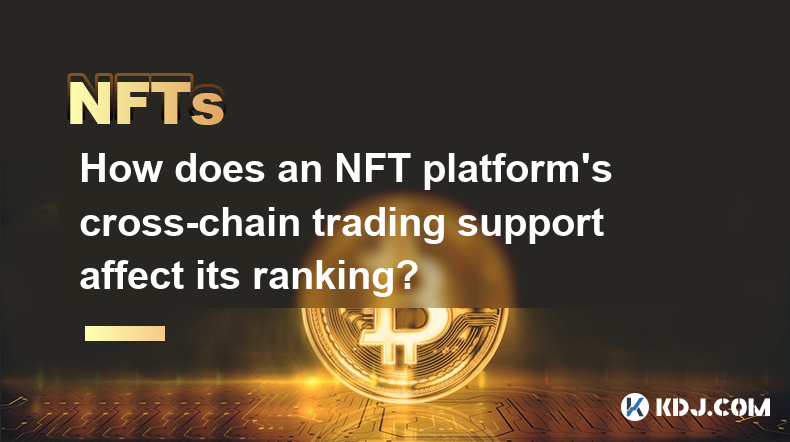
How does an NFT platform’s cross-chain trading support affect its ranking?
Apr 14,2025 at 04:49pm
The impact of an NFT platform's cross-chain trading support on its ranking is a multifaceted topic that delves into the technical capabilities, user experience, and market dynamics of the platform. Cross-chain trading refers to the ability of an NFT platform to facilitate the exchange of non-fungible tokens across different blockchain networks. This fea...
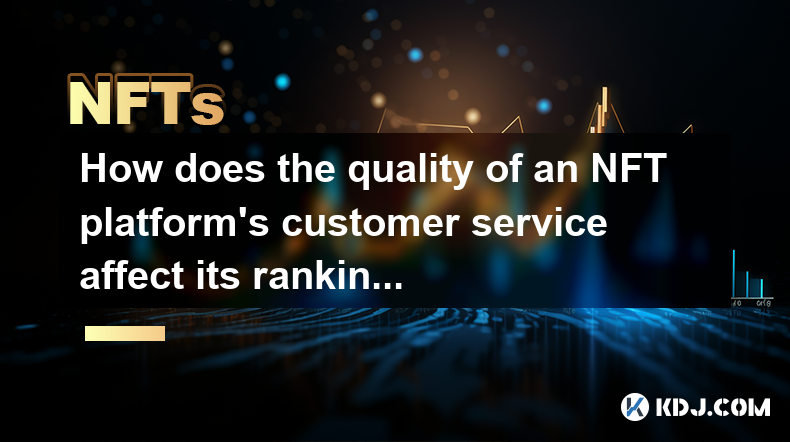
How does the quality of an NFT platform’s customer service affect its ranking?
Apr 15,2025 at 05:49am
The quality of an NFT platform's customer service plays a crucial role in determining its ranking within the competitive landscape of the cryptocurrency and NFT market. Customer service is often the bridge between a platform and its users, directly impacting user satisfaction, trust, and overall experience. This article delves into how different aspects...
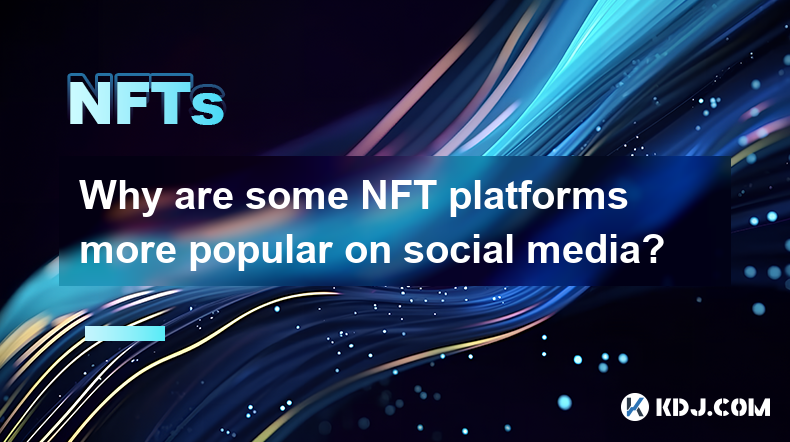
Why are some NFT platforms more popular on social media?
Apr 15,2025 at 01:00am
The popularity of NFT platforms on social media can be attributed to a variety of factors that influence their visibility, engagement, and overall appeal to users. Understanding these factors can provide insights into why certain platforms capture more attention and interaction on social media channels. User Experience and InterfaceUser experience (UX) ...
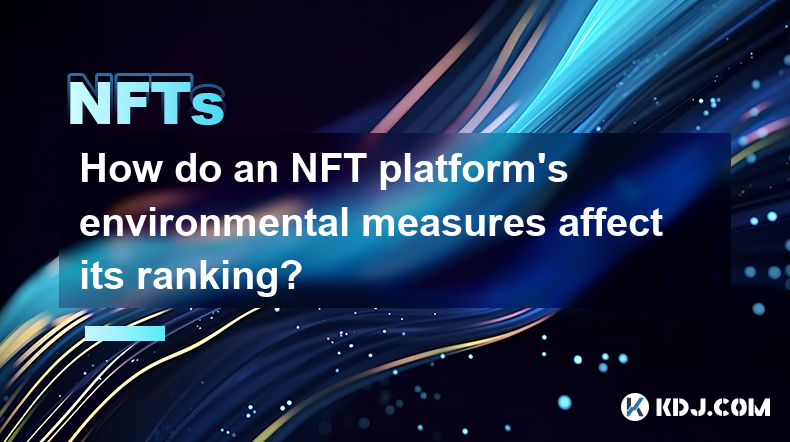
How do an NFT platform’s environmental measures affect its ranking?
Apr 15,2025 at 02:14am
The impact of an NFT platform's environmental measures on its ranking is a topic of growing importance within the cryptocurrency circle. As the digital art and collectibles market grows, so does the scrutiny over the environmental footprint of the blockchain technologies that support these platforms. This article will delve into how these environmental ...
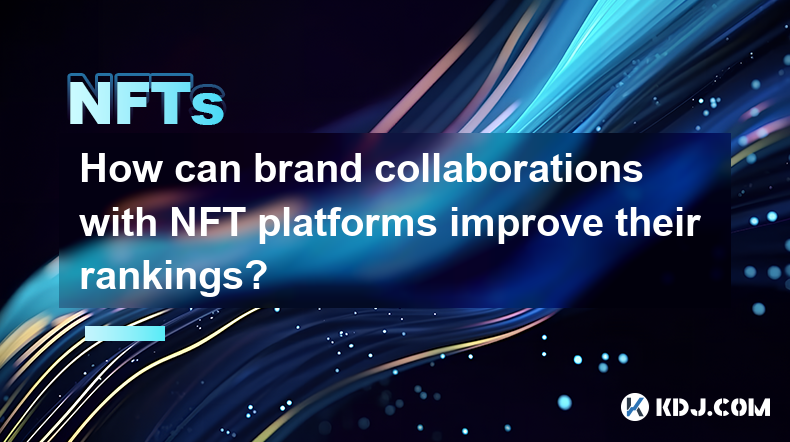
How can brand collaborations with NFT platforms improve their rankings?
Apr 15,2025 at 01:35am
Brand collaborations with NFT platforms have become increasingly popular in the cryptocurrency circle, offering a unique way to enhance visibility and rankings. By leveraging the strengths of both brands and NFT platforms, these collaborations can drive engagement, increase user base, and ultimately improve rankings on various metrics. In this article, ...

Which NFT platforms stand out in virtual fashion transactions?
Apr 15,2025 at 02:29am
In the dynamic world of cryptocurrency and digital assets, Non-Fungible Tokens (NFTs) have carved out a significant niche, particularly in the realm of virtual fashion. As the demand for unique digital wearables and accessories grows, several NFT platforms have emerged as leaders in facilitating these transactions. This article explores the standout NFT...

How does an NFT platform’s cross-chain trading support affect its ranking?
Apr 14,2025 at 04:49pm
The impact of an NFT platform's cross-chain trading support on its ranking is a multifaceted topic that delves into the technical capabilities, user experience, and market dynamics of the platform. Cross-chain trading refers to the ability of an NFT platform to facilitate the exchange of non-fungible tokens across different blockchain networks. This fea...

How does the quality of an NFT platform’s customer service affect its ranking?
Apr 15,2025 at 05:49am
The quality of an NFT platform's customer service plays a crucial role in determining its ranking within the competitive landscape of the cryptocurrency and NFT market. Customer service is often the bridge between a platform and its users, directly impacting user satisfaction, trust, and overall experience. This article delves into how different aspects...

Why are some NFT platforms more popular on social media?
Apr 15,2025 at 01:00am
The popularity of NFT platforms on social media can be attributed to a variety of factors that influence their visibility, engagement, and overall appeal to users. Understanding these factors can provide insights into why certain platforms capture more attention and interaction on social media channels. User Experience and InterfaceUser experience (UX) ...

How do an NFT platform’s environmental measures affect its ranking?
Apr 15,2025 at 02:14am
The impact of an NFT platform's environmental measures on its ranking is a topic of growing importance within the cryptocurrency circle. As the digital art and collectibles market grows, so does the scrutiny over the environmental footprint of the blockchain technologies that support these platforms. This article will delve into how these environmental ...

How can brand collaborations with NFT platforms improve their rankings?
Apr 15,2025 at 01:35am
Brand collaborations with NFT platforms have become increasingly popular in the cryptocurrency circle, offering a unique way to enhance visibility and rankings. By leveraging the strengths of both brands and NFT platforms, these collaborations can drive engagement, increase user base, and ultimately improve rankings on various metrics. In this article, ...
See all articles























































































